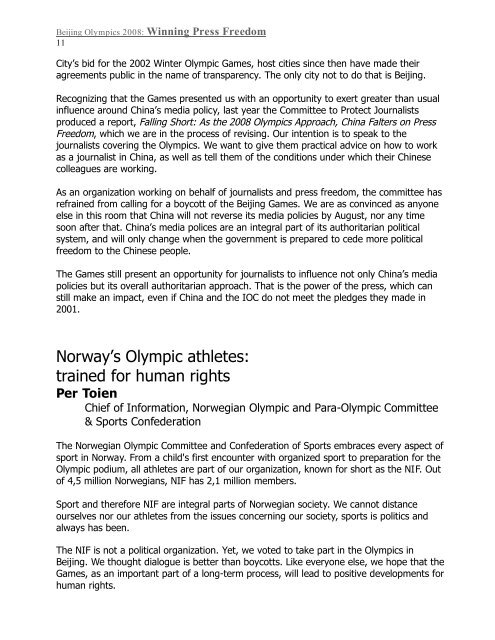Beijing Olympics 2008: Winning Press Freedom - World Press ...
Beijing Olympics 2008: Winning Press Freedom - World Press ...
Beijing Olympics 2008: Winning Press Freedom - World Press ...
Create successful ePaper yourself
Turn your PDF publications into a flip-book with our unique Google optimized e-Paper software.
<strong>Beijing</strong> <strong>Olympics</strong> <strong>2008</strong>: <strong>Winning</strong> <strong>Press</strong> <strong>Freedom</strong><br />
11<br />
City’s bid for the 2002 Winter Olympic Games, host cities since then have made their<br />
agreements public in the name of transparency. The only city not to do that is <strong>Beijing</strong>.<br />
Recognizing that the Games presented us with an opportunity to exert greater than usual<br />
influence around China’s media policy, last year the Committee to Protect Journalists<br />
produced a report, Falling Short: As the <strong>2008</strong> <strong>Olympics</strong> Approach, China Falters on <strong>Press</strong><br />
<strong>Freedom</strong>, which we are in the process of revising. Our intention is to speak to the<br />
journalists covering the <strong>Olympics</strong>. We want to give them practical advice on how to work<br />
as a journalist in China, as well as tell them of the conditions under which their Chinese<br />
colleagues are working.<br />
As an organization working on behalf of journalists and press freedom, the committee has<br />
refrained from calling for a boycott of the <strong>Beijing</strong> Games. We are as convinced as anyone<br />
else in this room that China will not reverse its media policies by August, nor any time<br />
soon after that. China’s media polices are an integral part of its authoritarian political<br />
system, and will only change when the government is prepared to cede more political<br />
freedom to the Chinese people.<br />
The Games still present an opportunity for journalists to influence not only China’s media<br />
policies but its overall authoritarian approach. That is the power of the press, which can<br />
still make an impact, even if China and the IOC do not meet the pledges they made in<br />
2001.<br />
Norway’s Olympic athletes:<br />
trained for human rights<br />
Per Toien<br />
Chief of Information, Norwegian Olympic and Para-Olympic Committee<br />
& Sports Confederation<br />
The Norwegian Olympic Committee and Confederation of Sports embraces every aspect of<br />
sport in Norway. From a child's first encounter with organized sport to preparation for the<br />
Olympic podium, all athletes are part of our organization, known for short as the NIF. Out<br />
of 4,5 million Norwegians, NIF has 2,1 million members.<br />
Sport and therefore NIF are integral parts of Norwegian society. We cannot distance<br />
ourselves nor our athletes from the issues concerning our society, sports is politics and<br />
always has been.<br />
The NIF is not a political organization. Yet, we voted to take part in the <strong>Olympics</strong> in<br />
<strong>Beijing</strong>. We thought dialogue is better than boycotts. Like everyone else, we hope that the<br />
Games, as an important part of a long-term process, will lead to positive developments for<br />
human rights.





